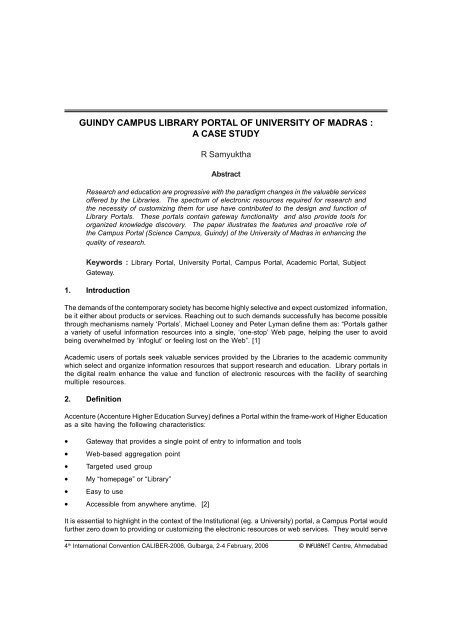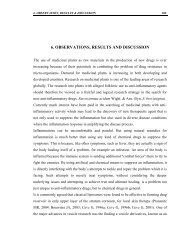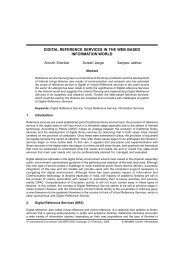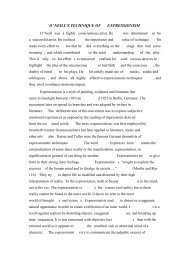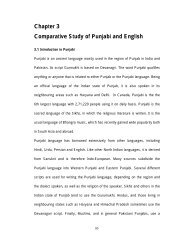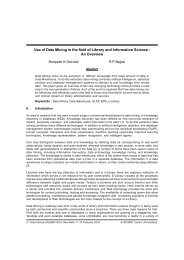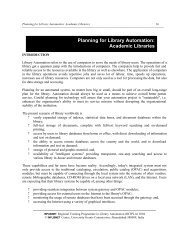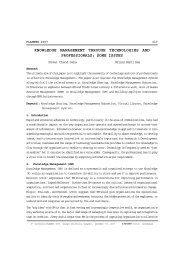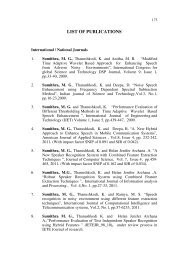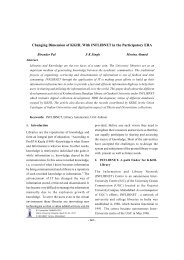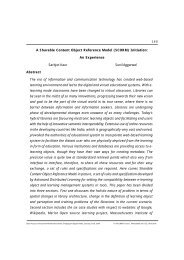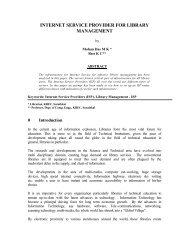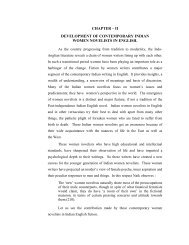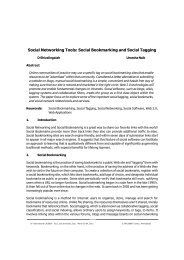guindy campus library portal of university of madras : a case study
guindy campus library portal of university of madras : a case study
guindy campus library portal of university of madras : a case study
Create successful ePaper yourself
Turn your PDF publications into a flip-book with our unique Google optimized e-Paper software.
704<br />
GUINDY CAMPUS LIBRARY PORTAL OF UNIVERSITY OF MADRAS :<br />
A CASE STUDY<br />
R Samyuktha<br />
Abstract<br />
Research and education are progressive with the paradigm changes in the valuable services<br />
<strong>of</strong>fered by the Libraries. The spectrum <strong>of</strong> electronic resources required for research and<br />
the necessity <strong>of</strong> customizing them for use have contributed to the design and function <strong>of</strong><br />
Library Portals. These <strong>portal</strong>s contain gateway functionality and also provide tools for<br />
organized knowledge discovery. The paper illustrates the features and proactive role <strong>of</strong><br />
the Campus Portal (Science Campus, Guindy) <strong>of</strong> the University <strong>of</strong> Madras in enhancing the<br />
quality <strong>of</strong> research.<br />
Keywords : Library Portal, University Portal, Campus Portal, Academic Portal, Subject<br />
Gateway.<br />
1. Introduction<br />
The demands <strong>of</strong> the contemporary society has become highly selective and expect customized information,<br />
be it either about products or services. Reaching out to such demands successfully has become possible<br />
through mechanisms namely ‘Portals’. Michael Looney and Peter Lyman define them as: “Portals gather<br />
a variety <strong>of</strong> useful information resources into a single, ‘one-stop’ Web page, helping the user to avoid<br />
being overwhelmed by ‘infoglut’ or feeling lost on the Web”. [1]<br />
Academic users <strong>of</strong> <strong>portal</strong>s seek valuable services provided by the Libraries to the academic community<br />
which select and organize information resources that support research and education. Library <strong>portal</strong>s in<br />
the digital realm enhance the value and function <strong>of</strong> electronic resources with the facility <strong>of</strong> searching<br />
multiple resources.<br />
2. Definition<br />
Accenture (Accenture Higher Education Survey) defines a Portal within the frame-work <strong>of</strong> Higher Education<br />
as a site having the following characteristics:<br />
• Gateway that provides a single point <strong>of</strong> entry to information and tools<br />
• Web-based aggregation point<br />
• Targeted used group<br />
• My “homepage” or “Library”<br />
• Easy to use<br />
• Accessible from anywhere anytime. [2]<br />
It is essential to highlight in the context <strong>of</strong> the Institutional (eg. a University) <strong>portal</strong>, a Campus Portal would<br />
further zero down to providing or customizing the electronic resources or web services. They would serve<br />
4 th International Convention CALIBER-2006, Gulbarga, 2-4 February, 2006 © INFLIBNET Centre, Ahmedabad
705<br />
as aggregators to organize and display information resources required specifically for their clientele<br />
(researchers, faculty etc.).<br />
3. Objective<br />
This paper plans to visualize the proactive role <strong>of</strong> the Guindy Campus Library Portal <strong>of</strong> University <strong>of</strong><br />
Madras taken up as a <strong>case</strong> <strong>study</strong>.<br />
4. Guindy Campus Library Portal<br />
University <strong>of</strong> Madras has an institutional <strong>portal</strong> which furnishes information to its stake-holders in a wider<br />
perspective pertaining to its mission and motto. Library services forming a component <strong>of</strong> the <strong>portal</strong>,<br />
provide a link to all the four Campus Libraries <strong>of</strong> the University namely, Chepauk, Guindy, Taramani and<br />
Marina. Each <strong>of</strong> these Campuses are dedicated to specific Schools <strong>of</strong> disciplines.<br />
Guindy Campus which caters to the academic needs <strong>of</strong> the Schools <strong>of</strong> Chemical, Physical, Life and<br />
Earth Sciences has an exclusive Campus Library Portal. This <strong>portal</strong> is at present accessible in the<br />
intranet only. Efforts had been taken to satiate the needs <strong>of</strong> the academic science community; a one stop<br />
point wherein the researcher saves much <strong>of</strong> his precious time to look for what he/she requires most<br />
importantly and urgently – starting from the basic Library Info to specialized electronic resources such<br />
as Subject Gateways.<br />
The following illustrates the facets <strong>of</strong> the Campus Portal. [3]<br />
4.1 Library Info<br />
• Library pr<strong>of</strong>ile : Provides information about the Working hours, Library Collection, Membership<br />
details, Borrowing eligibility, Library staff, Details <strong>of</strong> the faculty <strong>of</strong> the Campus and the Floor Plan <strong>of</strong><br />
the Library.
706<br />
• Services : Both traditional services and value added electronic information services are listed to<br />
give an overview <strong>of</strong> the <strong>library</strong> services <strong>of</strong>fered.<br />
• News & Events : Information regarding forthcoming Seminars, Conferences or Workshops<br />
organized by the Departments <strong>of</strong> the Campus, Orientation programmes for Research scholars,<br />
Refresher courses for faculty etc are periodically furnished<br />
• Photo Gallery : Displays an image gallery <strong>of</strong> the events organized by the Library such as<br />
Workshops, Orientation programmes, Faculty interaction programmes and also those<br />
associated with the Librarian who spearheads & participates in various events.<br />
4.2 Search Facility<br />
• Member Status : The Library members could check out the transactions, about what documents<br />
are due to be returned and could renew the borrowing period from their desktop without<br />
having to walk into the Library.<br />
• Books / Theses : Members have the OPAC accessible in the intranet to search for the books their<br />
require the no. <strong>of</strong> copies available, locate theses by various parameters such as by the Guide,<br />
Author, Keyword, Title, Accession no etc. Details <strong>of</strong> submission from which Department and<br />
whether it is a doctoral or M.Phil. dissertation is also indicated. University being a research<br />
institution, a lot many searches are done for Theses.<br />
• E-Alerts : Electronic alerts <strong>of</strong> table <strong>of</strong> contents <strong>of</strong> important journals what the <strong>campus</strong> Library<br />
does not subscribe to are posted for browsing.<br />
• Journals Subscribed : The currently subscribed print journals and the archive <strong>of</strong> subscribed<br />
journals can be searched for availability with details <strong>of</strong> missing volumes and the receipt date <strong>of</strong><br />
latest issues. This enables the user to know if the current issue is displayed for use thus saving<br />
his precious time.<br />
• INFONET Journals and Databases : The electronic resources under the UGC INFONET consortia<br />
both electronic journals and databases can be searched alphabetically, by subject coverage or by<br />
publisher. The links created at the <strong>portal</strong> for journals in the consortia (over 6000 e journals) helps<br />
the user to access the homepage <strong>of</strong> the journal right away and download the full text articles<br />
required. There has been an overwhelming appreciation for this facility because <strong>of</strong> the ease at<br />
which they can access electronic resources.<br />
• Subject Gateways : The Library has been indeed very proactive in extending exclusive support to<br />
the research done in the Schools <strong>of</strong> the Campus. Subject Gateways or compilation <strong>of</strong> electronic<br />
resources on themes with specific focus areas prove as strong linkages to enhance research.
707<br />
Details <strong>of</strong> the Disciplines (relating to the Schools <strong>of</strong> the Campus) and the themes on which electronic<br />
resources are compiled are listed below.<br />
• Biomedical Sciences - Herbal Medicine<br />
Medical Informatics<br />
Molecular & Cell Biology<br />
Microbial Biotechnology & Bioinformatics<br />
Nutraceuticals<br />
• Life Sciences - Life Science Trends in Plant Biotechnology<br />
Ecology and coastal environment<br />
• Chemical Sciences - Catalysis<br />
Chemistry and Materials<br />
Methods <strong>of</strong> Chemical analysis<br />
• Physical Sciences - Physics<br />
Photonics<br />
• Earth Sciences - Earth Sciences<br />
• Social Sciences - Library and Information Science<br />
Research Methods in Social Sciences<br />
• Interdisciplinary - Electronic research tools<br />
Nanoscience and Nanotechnology<br />
Research funding and Proposal writing<br />
• Open Access Resources : In the light <strong>of</strong> the open access movement gaining ground globally, it<br />
was felt that open sources <strong>of</strong> journals, directories, tutorials, powerpoint presentations, Conference<br />
proceedings etc provide a rich supplement to research.
708<br />
4.3 Other Resource Links<br />
Links to important fund granting organizations, government bodies, institutions etc like the UGC, DBT,<br />
DST, CSIR which are time again required to be accessed to apply for projects etc. also serve as quick<br />
access points.<br />
5. Methodology<br />
The data required to be uploaded on the <strong>portal</strong> is done periodically. Constant scrutiny, reviewing, evaluation<br />
<strong>of</strong> resources, removing dead links forms the back-end tasks.<br />
Focus areas on specific themes are arrived at with several discussions with the respective faculty and<br />
scholars and also as a result <strong>of</strong> the queries received time and again to furnish details. Open sources,<br />
several institutions like universities who give access to resources are given links to.<br />
Internet, indeed has been a major highway to cull out the required information after constant evaluation<br />
<strong>of</strong> the resources.<br />
6. Librarian’s Role<br />
Academic Librarians play a major role in evaluating and organizing the content created in the Campus<br />
<strong>portal</strong>s in tune with their parent institutions. Right from planning to implementation, knowledge about<br />
copyright, expertise in creating customized web-based information delivery systems are several <strong>of</strong> the<br />
skills that they display. [4]<br />
In tune with these skills the Library personnel <strong>of</strong> the Guindy Campus Library too have exercised keen<br />
interest in determining what is valuable with more scholarly focus to support the academic programs<br />
<strong>of</strong>fered by the Campus.<br />
7. Future Plans<br />
The Library intends to build up an Institutional Repository (IR) <strong>of</strong> the research output <strong>of</strong> the Campus <strong>of</strong><br />
Journal articles, Research Reports, Conference Proceedings Lecture material and also the Theses or<br />
Dissertations. Being a institution <strong>of</strong> higher education the need for an IR is deemed essential. The<br />
Library personnel have undergone training with the required s<strong>of</strong>tware to establish an IR and progress in<br />
this direction would enhance the visibility and use <strong>of</strong> the institutional research output.<br />
8. Conclusion<br />
The Guindy Campus Library <strong>portal</strong> was an initial attempt to customize the existing resources like the<br />
<strong>library</strong> catalog, commercial full text databases, electronic journals, Subject Gateways etc accessible in<br />
the intranet. More resources tailored to the user requirements would be added as and when possible.<br />
Next move would be to integrate all the four Campuses <strong>of</strong> the University <strong>of</strong> Madras for a cooperative effort<br />
to share their respective areas <strong>of</strong> strength. This would enrich the level <strong>of</strong> content in the institutional <strong>portal</strong><br />
environment. Library <strong>portal</strong> would translate to Scholarly <strong>portal</strong>s leading users to discover the depth <strong>of</strong><br />
information at their fingertips.
709<br />
9. References<br />
1. Looney, Michael and Lyman, Peter. Portals in higher education: What are they and what is their<br />
potential www.educause.edu/pub/er/ermoo/articles004/looney.pdf (accessed on 27.12.2005)<br />
2. Mc-Donald, Robert H. Portals in libraries: an environmental landscape. ASSIS & T Bulletin Oct/<br />
Nov 2004.pp.1-3. http://www.asis.org/Bulletin/Oct-04/mcdonald.html (accessed on 27.12.2005.<br />
3. Guindy Campus Library Online Public Access Catalogue <strong>of</strong> University <strong>of</strong> Madras (available on<br />
intranet only) http://gclserver.unom.ac.in/opac.<br />
4. Zemon, Mickey. The librarian’s role in <strong>portal</strong> development: providing unique perspectives and<br />
skills. C &R L News, July/August 2001.62:7.pp1-2. http://www.ala.org/ala/acrl/acrlpubs/<br />
crlnews/backissues2001/julyaugust2/librarian’s role.htm (accessed on 22.12.2005)<br />
5. Gourley, Don. Library <strong>portal</strong> roles in a Shibboleth Federation http://shibboleth.internet2.edu/docs/<br />
gourley-shibboleth-<strong>library</strong>-<strong>portal</strong>s-200310.html (accessed on 23.12.2005)<br />
6. Jacobson, Carl. Institutional information <strong>portal</strong>s. Educause review. July/Aug 2000.pp58 – 59<br />
www.educause.edu/pub/er/ermoo/articles004/horizons.pdf (accessed on 27.12.2005)<br />
7. Little, John R. A librarian’s perspective on Portals. Educause Quarterly 2001.54:2.pp 52-54.<br />
www.edu<strong>case</strong>.edu/ir/<strong>library</strong>/pdf/eqm0124.pdf (accessed on 22.12.2005)<br />
8. Lowry, Charles B. Let’s call the “Ubiquitous Library” Instead… Portal : Libraries and the academy<br />
2005. 5:3, pp.293-296 http://muse.jhu.edu/journals/<strong>portal</strong>_libraries_and_the_academy/v005/5.3/<br />
lowry.pdf (accessed on 22.12.2005)<br />
9. Savarese, John. Library Portals and what’s next. www.<strong>campus</strong>-technology.com/article.aspid<br />
=11087 (accessed on 23.12.2005)<br />
10. Thomas, Sarah E. Using the <strong>portal</strong> for the discovery <strong>of</strong> discipline-based electronic resources.<br />
http://w3.uniromal.it/ssab/er/relazioni/thomas_eng.pdf (accessed on 27.12.2005)<br />
About Author<br />
Dr. R. Samyuktha designed as Deputy Librarian, University <strong>of</strong> Madras, presently<br />
heads the Science Campus (Guindy Campus) <strong>of</strong> the University. With a basic<br />
graduation in Nutrition and Dietetics, has a post graduation in Public Administration<br />
and a doctorate in Information Science. Work experience <strong>of</strong> nearly twenty five years<br />
has enabled roles <strong>of</strong> organizing and participating in several Workshops, Seminars,<br />
Conferences, Training and Orientation programmes. Member in several Expert<br />
Committees, Pr<strong>of</strong>essional bodies, Co-ordinator <strong>of</strong> the UGC INFONET consortia for<br />
University <strong>of</strong> Madras and proactive in facilitating <strong>library</strong> services to the research<br />
community.<br />
E-Mail : samyuktharavi@yahoo.co.in


